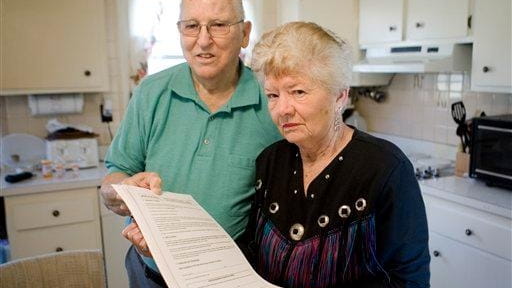FHA mortgage premium costs set to rise

Ben Kreisher and his wife Pati pose for a photograph as they display documents from the closing of their mortgage at their home in East Goshen, Pa. (Dec. 20, 2007) Credit: AP
Borrowers who want to get a mortgage insured by the Federal Housing Administration should act quickly to avoid changes the agency is making to shore up its faltering insurance fund.
The U.S. Department of Housing and Administration announced the changes Jan. 30.
Here's the timing: FHA will raise the annual mortgage insurance premium on most loans that have a case number starting April 1 or later. To get a case number before the April 1 deadline and avoid the increase, borrowers should apply with a lender no later than March 25, says Julian Hebron, vice president with RPM Mortgage in San Francisco.
On most FHA loans, the annual premium will increase by 0.10 percentage point, or $100 per year for each $100,000 in loan amount.
For loans greater than $625,000 with a term longer than 15 years, the increase will be 0.05 percentage point, or $50 per year for each $100,000 in loan amount.
The premium itself varies depending on the loan size, term and loan-to-value ratio, but here's an example:
For a $500,000, 30-year loan with a loan-to-value ratio greater than 95 percent, the new premium will be 1.35 percent, or $6,750 per year, up from 1.25 percent, or $6,250 per year. On a monthly basis, the premium increase amounts to about $42.
For a chart showing premiums increases for various loan types, check out Hebron's blog at tinyurl.com/as4xsqb. These premium increases do not apply if a borrower refinances an existing FHA loan that was endorsed on or before May 31, 2009, into a new FHA loan under the streamline-refinancing program.
FHA is not changing the one-time premium borrowers pay up front; it remains at 1.75 percent of the loan amount.
In a potentially bigger hit, FHA borrowers will have to continue paying annual mortgage insurance premiums for a longer period of time -- in most cases for the life of the loan.
This change will apply to new loans with case numbers starting June 3. To avoid this change, borrowers should try to apply by May 24, Hebron says.
In the past, FHA automatically canceled mortgage insurance on most loans when a borrower, anytime after five years, had made enough payments to reduce the balance to 78 percent of the original loan amount.
A borrower taking out a 30-year loan with 10 percent down could usually eliminate mortgage insurance after about six years of making normal payments, or after five years if they made extra principal payments, Hebron says.
(If the original loan term was 15 years or less, the five-year rule didn't apply; FHA would cancel the insurance when the balance dropped to 78 percent.)
In the future, if the borrower starts off with a loan-to-value ratio above 90 percent, FHA will collect the premium for the life of the loan. If the original ratio is between 78 and 90 percent, FHA will cancel the premium if the balance drops below 78 percent of the original loan amount anytime after 11 years.
